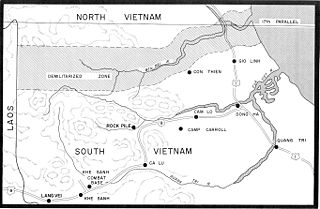
A demilitarized zone is an area in which treaties or agreements between states, military powers or contending groups forbid military installations, activities, or personnel. A DZ often lies along an established frontier or boundary between two or more military powers or alliances. A DZ may sometimes form a de facto international border, such as the Korean Demilitarized Zone. Other examples of demilitarized zones are a 9-mile wide area between Iraq and Kuwait; Antarctica ; and outer space.

Gloria Marie Steinem is an American journalist and social-political activist who emerged as a nationally recognized leader of second-wave feminism in the United States in the late 1960s and early 1970s.

Panmunjom, also known as Panmunjeom, now located in Paju, Gyeonggi Province, South Korea or Panmun-guyok, Kaesong, North Korea, was a village just north of the de facto border between North and South Korea, where the 1953 Korean Armistice Agreement that ended the Korean War was signed. The building where the armistice was signed still stands.
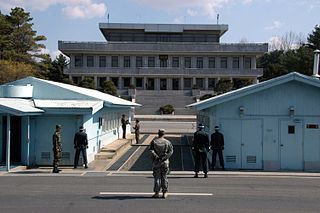
The Korean Demilitarized Zone is a strip of land running across the Korean Peninsula near the 38th parallel north. The demilitarized zone (DMZ) is a border barrier that divides the peninsula roughly in half. It was established to serve as a buffer zone between the countries of North Korea and South Korea under the provisions of the Korean Armistice Agreement in 1953, an agreement between North Korea, China, and the United Nations Command.

Cheorwon County, also spelled Chorwon, is a county in Gangwon Province, South Korea. It is located right next to the border with North Korea.

The Military Demarcation Line (MDL), sometimes referred to as the Armistice Line, is the land border or demarcation line between North Korea and South Korea. On either side of the line is the Korean Demilitarized Zone (DMZ). The MDL and DMZ were established by the Korean Armistice Agreement.
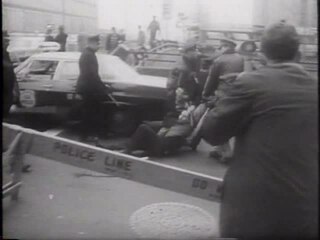
A peace walk or peace march, sometimes referred to as a peace pilgrimage, is a form of nonviolent action where a person or group marches a set distance to raise awareness for particular issues important to the walkers.
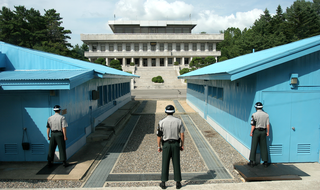
The Joint Security Area is the only portion of the Korean Demilitarized Zone (DMZ) where North and South Korean forces stand face-to-face. The JSA is used by the two Koreas for diplomatic engagements and, until March 1991, was also the site of military negotiations between North Korea and the United Nations Command (UNC).

A sex strike, or more formally known as Lysistratic nonaction, is a method of nonviolent resistance in which one or more persons refrain from or refuse sex with partners until policy or social demands are met. It is a form of temporary sexual abstinence. Sex strikes have been used to protest many issues, from war to gang violence to policies.
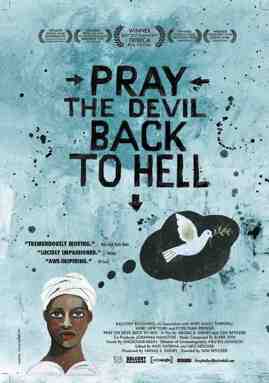
Pray the Devil Back to Hell is a 2008 American documentary film directed by Gini Reticker and produced by Abigail Disney. The film premiered at the 2008 Tribeca Film Festival, where it won the award for Best Documentary. The film had its theatrical release in New York City on November 7, 2008. It had cumulative gross worldwide of $90,066.

Women of Liberia Mass Action for Peace is a peace movement started in 2003 by women in Monrovia, Liberia, Africa, that worked to end the Second Liberian Civil War. Organized by Crystal Roh Gawding and social workers Leymah Gbowee and Comfort Freeman, the movement began despite Liberia having extremely limited civil rights. Thousands of Muslim and Christian women from various classes mobilized their efforts, staged silent nonviolence protests that included a sex strike and the threat of a curse.

Leymah Roberta Gbowee is a Liberian peace activist responsible for leading a women's nonviolent peace movement, Women of Liberia Mass Action for Peace that helped bring an end to the Second Liberian Civil War in 2003. Her efforts to end the war, along with her collaborator Ellen Johnson Sirleaf, helped usher in a period of peace and enabled a free election in 2005 that Sirleaf won. Gbowee and Sirleaf, along with Tawakkul Karman, were awarded the 2011 Nobel Peace Prize "for their non-violent struggle for the safety of women and for women's rights to full participation in peace-building work."

Abigail Edna Disney is an American documentary film producer, philanthropist, and social activist. She produced the 2008 documentary Pray the Devil Back to Hell. Disney and Kathleen Hughes are producers and directors of Outstanding Social Issue Documentary Emmy Award winning The Armor of Light (2015) and The American Dream and Other Fairy Tales.
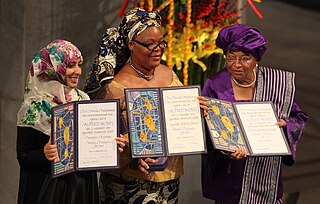
The 2011 Nobel Peace Prize was jointly awarded to three female political activists. Two African and one Asian female were awarded for their persistence in obtaining equal rights for women.

Women in the World was a live journalism platform that was founded by Tina Brown in 2010 to "discover and amplify the unheard voices of global women on the front lines of change."

Erika Guevara Rosas is a Mexican-American human rights lawyer and feminist, and the Americas Director at Amnesty International (AI), Prior to her tenure with AI, she was the Americas Director at the Global Fund for Women.

Ebenezer Norman is a Liberian philanthropist, humanitarian, public speaker, and founder of the education non-profit A New Dimension of Hope (NDHope). He is involved in humanitarian efforts in Liberia and throughout West Africa, notably for efforts to build schools in attenuated or war-torn communities after the Second Liberian Civil War in 2003 and the Ebola virus epidemic in Liberia in 2015.
Thelma Arimiebi Ekiyor is a Nigerian social entrepreneur and impact investor who has served in authoritative positions within many organizations. Ekiyor has focused primarily on investing in women entrepreneurs. She started her career supporting women in peacebuilding and empowering women and youth through financial independence and educational access. She has experience with projects in more than 22 African countries. Ekiyor worked in post-conflict countries such as Liberia with the peace activist Leymah Gbowee.

Christine Ahn is a Korean-American peace activist who serves as the Executive Director of Women Cross DMZ, an organization of women advocating for an end to the Korean War. In 2015, she led 30 international women peacemakers across the De-Militarized Zone (DMZ) from North Korea to South Korea. She is also the 2020 winner of the US Peace Prize for her work for peace on the Korean peninsula and her advocacy for women's leadership in peace-building efforts.


















